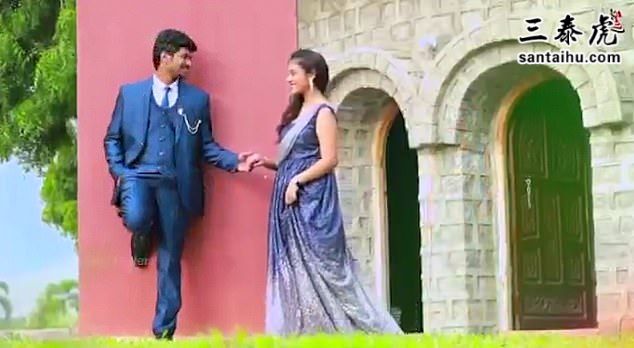Moment Indian husband is hacked to death in front of his pregnant wife in honour killing because he was from a lower caste
荣誉谋杀:一印度丈夫在怀孕妻子面前被砍死,就因为他来自一个低种姓

A husband has been brutally hacked to death with a machete in front of his pregnant wife in a suspected honour killing in India.
在印度,一名丈夫在怀孕的妻子面前被残忍地砍死。
Pranay Kumar, 24, was leaving a hospital with 23-year-old wife Amrutha Varshini in a village near the city of Hyderabad when he was attacked on September 14.
9月14日在海德拉巴市附近一个村庄,24岁的普拉纳伊·库马尔(Pranay Kumar)和23岁的妻子阿姆鲁塔·瓦什尼(Amrutha Varshini) 离开医院时遭到袭击。
An unidentified man was filmed on CCTV walking up behind Pranay with a machete before hacking him across the back of the neck as Amrutha watches on.
监控拍摄到一名身份不明的男子拿着砍刀走到普拉纳伊身后,当着阿姆鲁塔的面砍向他的后颈。

The desperate wife could be seen trying to stop the assault as Pranay slumps to the floor, but the man delivers another crushing blow to his head.
普拉纳伊摔倒在地,绝望的妻子试图阻止袭击,但这名男子又给他的头部致命一击。
The attacker then throws away his machete and walks off as Amrutha runs inside the hospital to summon help for her stricken husband.
随后袭击者扔掉了砍刀逃走了,阿姆鲁塔跑进医院为受伤的丈夫求救。
Despite medics efforts he succumbed to his injuries a short time afterward.
尽管医生努力抢救,但没过多久普拉纳伊就因伤势过重而去世。
Police are investigating the attack as an honour killing which they believe was carried out because the pair were from different castes.
警方正在调查这起袭击事件,他们认为这是一起荣誉谋杀,因为两人来自不同的种姓。
Amrutha was from the vaishya caste comprised of farmers and traders while Pranay was a Dalit Christian, also known as an 'untouchable'.
阿姆鲁塔来自吠舍种姓,由农民和商人组成,普拉纳伊则是一名达利特基督徒,也被称为“贱民”。
The pair originally married in January, against the wishes of both of their families.
这对夫妇是在1月份结婚的,但这违背了他们两个家庭的愿望。
However, Pranay's family had since accepted the union and decided to hold a reception for the two in August.
然而,普拉纳伊的家人后来接受了他们的结合,并决定在8月为二人举办喜宴。

Police were alerted to the marriage after the couple invited several officers to the reception and gave the couple a warning.
这对夫妇邀请了几名官员参加喜宴,警方注意到了这桩婚姻并向这对夫妇发出了警告。
Nalgonda Srinivas, deputy superintendent of police, said: 'I had my suspicions about [Amrutha's] father and had warned the couple.
副警司斯里尼瓦称说:“我对阿姆鲁塔的父亲产生了怀疑,并警告过这对夫妇。”
'When they held the reception in August, we gave out notices and had deployed a few police officers at the venue so that nothing bad happened.'
“8月份他们举办喜宴时,我们发出了通知并在会场部署了几名警察,所以没有发生什么糟糕的事情。”
It is thought the killing could have been prompted by Amrutha posting a wedding video of the pair on Facebook.
据悉,这起凶杀案的起因可能是阿姆鲁塔在Facebook上发布了两人的婚礼视频。
Amrutha has told local media that she believes her father and uncle were behind the attack. Officers are investigating but have yet to make any arrests.
阿姆鲁塔告诉当地媒体,她认为她的父亲和叔叔是袭击的幕后黑手。警方正在调查此事,但尚未逮捕任何人。
Police say Amrutha's father was questioned in March over the possibility he would use violence to break up the marriage, but insisted he had no plans to do so.
警方表示,阿姆鲁塔的父亲在3月份曾因涉嫌使用暴力手段破坏婚姻而受到质询,但他坚称自己没有作案计划。
Brahmins, Kshatriyas, Vaishyas and Shudras: What is the caste system, and how is the Indian government taking steps to limit caste discrimination?
婆罗门、刹帝利、吠舍和首陀罗:什么是种姓制度,印度政府如何采取措施限制种姓歧视?
The Indian caste system is one of the oldest forms of social hierarchies in exstence.
印度种姓制度是现存最古老的社会等级制度之一。
Developed over thousands of years, the system relies on karma (work) and dharma (religion) to determine a Hindu's social standing.
该制度经过数千年的发展,依据因果报应(业)和达摩(宗教)来决定一个印度教徒的社会地位。
The caste system divides Hindus into four main categories - Brahmins, Kshatriyas, Vaishyas and the Shudras.
种姓制度将印度人分为四大类:婆罗门、刹帝利、吠舍和首陀罗。
Top of the tree in the Hindu hierarchy are the Brahmins who traditionally fill the most high-powered jobs.
在印度教等级制度中,地位最高的是婆罗门,传统上担任最高职位(主要掌管宗教祭祀,充任不同层级的祭司。其中一些人也参与政治,享有很大政治权力。)。
Kshatriyas, or the warriors and rulers, come second.
其次是刹帝利,主要为武士和统治者(掌握军事和政治大权的等级)
Vaishyas, or the traders, and are made up mostly of businessmen and women.
第三是吠舍,主要为商人(主要从事农业、牧业和商业)
Finally there are the Shudras, considered by some to be the 'working class', who perform many of the menial jobs in society.
最后是首陀罗,被一些人认为是“劳动阶级”,他们在社会中从事很多低贱的工作。
Outside the Indian caste system there are the Dalits - or 'untouchables'.
在印度种姓制度之外,还有达利特——又称“贱民”(不可接触者)。
Centuries of tradition have seen caste dictate many aspects of Indian life, including who one can marry and where one can live.
几个世纪以来,种姓制度一直主宰着印度生活的方方面面,包括通婚,居住地等等。
Traditionally, the system bestowed many privileges on the upper castes while sanctioning repression of the lower castes by privileged groups.
传统上,这一制度赋予上层种姓许多特权,同时又允许特权群体对下层种姓进行镇压。
Often criticised for being unjust and regressive, it remained virtually unchanged for centuries, trap people into fixed social orders from which it was impossible to escape.
种姓制度常常因其不公和倒退而受到批评,几个世纪以来几乎没有改变,使人们陷入固定的社会秩序,无法摆脱。
In 1950 the Indian government brought in measures to ensure greater equality across the caste divide.
1950年,印度政府采取措施确保跨越种姓鸿沟的更大平等。
Since then it has been illegal to discriminate against a person based on their caste and some jobs even have 'caste quotas'.
从那以后,基于种姓歧视他人是违法的,有些工作甚至有“种姓配额”。
In more recent times the caste system's influence has begun to decline in modern urban areas.
最近,种姓制度在现代城市地区的影响力开始下降。
There are, however, millions of rural communities across India which still enforce the strict rules dictated by the tradition.
然而,印度各地仍有数以百万计的农村社区执行严格的种姓传统规定。
来源:三泰虎 http://www.santaihu.com/46096.html 译者:Jessica.Wu
此文由 三泰虎 编辑,未经允许不得转载!:首页 > 英国 » 英媒:低种姓印度丈夫在怀孕妻子面前被砍死
 印度“黑公交案”轮奸犯的妻子请求在临刑前离婚,“以免余生成为寡妇”
印度“黑公交案”轮奸犯的妻子请求在临刑前离婚,“以免余生成为寡妇” 嫁妆纠纷引起的?印度一女子被丈夫斩首
嫁妆纠纷引起的?印度一女子被丈夫斩首 生下双胞胎后,74岁的她和丈夫一起住进重症监护室
生下双胞胎后,74岁的她和丈夫一起住进重症监护室 印度男子拿妻子下注,输了后允许朋友和亲戚轮奸其妻子
印度男子拿妻子下注,输了后允许朋友和亲戚轮奸其妻子 拒绝和高种姓邻居发生关系,13岁印度女孩被杀害
拒绝和高种姓邻居发生关系,13岁印度女孩被杀害 “命根子”差点被剪掉,他说是妻子干的
“命根子”差点被剪掉,他说是妻子干的 印度父亲不同意女儿嫁给不同种姓的男子,活活烧死女儿
印度父亲不同意女儿嫁给不同种姓的男子,活活烧死女儿 被家人嘲笑做的饭菜不好吃,印度妻子在乔迁酒席上毒死5人
被家人嘲笑做的饭菜不好吃,印度妻子在乔迁酒席上毒死5人